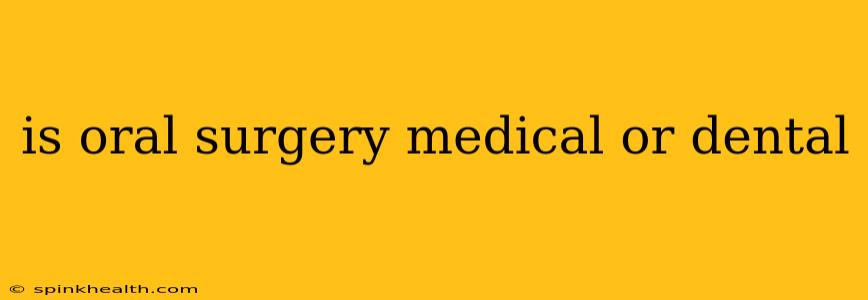Is Oral Surgery Medical or Dental? The Surprisingly Complex Answer
The question, "Is oral surgery medical or dental?" isn't as simple as a yes or no. It's a bit like asking if a cardiothoracic surgeon is a heart doctor or a lung doctor – they're both! Oral surgery sits at the fascinating intersection of medicine and dentistry, borrowing expertise and techniques from both worlds.
Imagine this: A patient walks into a dental office complaining of persistent jaw pain. A simple dental procedure might not suffice. The pain could stem from a complex wisdom tooth impaction, a temporomandibular joint (TMJ) disorder, or even an underlying medical condition affecting the bones of the face. This is where the realm of oral and maxillofacial surgery enters the picture.
Oral and maxillofacial surgeons (OMSs) are highly specialized dentists who have undergone extensive additional training beyond dental school. Their expertise goes far beyond simple tooth extractions. They perform intricate procedures that blend the precision of dentistry with the broader medical knowledge required to address complex anatomical structures and systemic health issues.
What Makes Oral Surgery Unique? The Blending of Disciplines
Oral surgery's unique position arises from its multifaceted nature:
-
The Dental Foundation: OMSs possess a deep understanding of dental anatomy, physiology, and pathology. They can expertly diagnose and treat a range of dental issues, from impacted teeth to oral cancers. Their training encompasses advanced techniques in tooth extraction, bone grafting, and implant placement.
-
The Medical Expertise: However, oral surgery extends far beyond the confines of the mouth. OMSs often handle conditions impacting the jaw, facial bones, and surrounding soft tissues. This necessitates a strong medical foundation, including knowledge of anesthesia, infection control, and managing patients with complex medical histories. They may need to diagnose and treat infections, injuries, and even perform reconstructive surgery after trauma.
Addressing Common Questions
Here are some frequently asked questions that further clarify the dual nature of oral surgery:
1. What kind of medical conditions might an oral surgeon treat?
An oral surgeon might treat a range of medical conditions that impact the oral cavity and surrounding structures. These could include:
- Facial fractures: Repairing broken bones in the face after an accident.
- TMJ disorders: Managing pain and dysfunction of the temporomandibular joint.
- Oral cancers: Diagnosing and treating cancerous lesions in the mouth and surrounding tissues.
- Cysts and tumors: Removing benign or malignant growths in the jaw or mouth.
- Sleep apnea: Performing procedures to improve breathing during sleep.
2. Do oral surgeons perform general surgery?
While oral surgeons don't perform all types of general surgery, their training equips them to handle surgical procedures specifically related to the head and neck region. This often involves a level of surgical skill comparable to other surgical specialties.
3. How much training is required to become an oral and maxillofacial surgeon?
Becoming an OMS involves a rigorous journey. It typically begins with dental school, followed by a four-year residency in oral and maxillofacial surgery. This extensive training is crucial to develop the sophisticated skills needed for this demanding specialty.
4. When should I see an oral surgeon?
You should consult an oral surgeon if you're experiencing:
- Severe jaw pain or discomfort.
- Difficulty opening your mouth.
- A facial injury.
- A lump or growth in your mouth or jaw.
- Impacted wisdom teeth that are causing problems.
In essence, oral surgery is a uniquely interdisciplinary field. It's rooted in dentistry but incorporates substantial medical knowledge and surgical expertise, bridging the gap between two significant areas of healthcare. The next time you hear the term “oral surgery,” remember the multifaceted nature of this critical medical and dental specialty.

